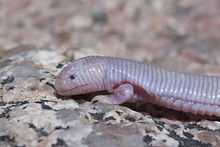Mexican mole lizard
| Mexican mole lizard | |
|---|---|
 | |
| Conservation status | |
| Scientific classification | |
| Kingdom: | Animalia |
| Phylum: | Chordata |
| Class: | Reptilia |
| Order: | Squamata |
| Family: | Bipedidae |
| Genus: | Bipes |
| Species: | B. biporus |
| Binomial name | |
| Bipes biporus (Cope, 1894) | |
| Synonyms | |
The Mexican mole lizard (Bipes biporus), commonly known as the five-toed worm lizard, ajolote, or simply as Bipes, is a species of amphisbaenian, which is endemic to Baja California, Mexico. It is one of four species of amphisbaenians that have legs. Also it is one of only two non-extinct genera of reptiles to have only front limbs, with Jarujinia bipedalis.[citation needed] It should not be confused with the axolotl, a salamander (Ambystoma mexicanum), which is usually called ajolote in Spanish.
Description
They are pink, lizard-like reptiles, 18–24 cm (7.1–9.4 in) snout-to-vent length and 6–7 mm (0.24–0.28 in) in width, that live for one to two years. Their skin is closely segmented to give a corrugated appearance, and like earthworms, their underground movement is by peristalsis of the segments. The forelegs are strong and paddle-like, while the hindlegs have disappeared, leaving behind only vestigial bones visible in X-rays.
Reproduction
This species is oviparous and the females lay one to four eggs in July. The species only breeds underground. The eggs hatch after two months.
Geographic range
The Mexican mole lizard is found only in Baja California, Mexico.
Behavior
Like all other amphisbaenians, this burrowing species only surfaces at night or after heavy rain.
Diet
It is an opportunist carnivore and eats ants, termites, ground-dwelling insects, larvae, earthworms, and small animals including lizards. It usually pulls its prey down to the ground to start its meal.
References
- ↑ Stejneger, L., and T. Barbour. 1917. A Check List of North American Amphibians and Reptiles. Harvard University Press. Cambridge, Massachusetts. 125 pp. (Bipes biporus, p. 72.)
Further reading
- Cope, E.D. 1894. On the Genera and Species of Euchirotidæ. American Naturalist 28: 436-437. (Euchirotes biporus)
- Stebbins, R.C. 2003. A Field Guide to Western Reptiles and Amphibians, Third Edition. The Peterson Field Guide Series. Houghton Mifflin. Boston and New York. xiii + 533 pp. ISBN 0-395-98272-3 (paperback). (Bipes biporus, pp. 428-429 + Plate 55 + Map 200.)
External links
- http://animals.jrank.org/pages/3700/Mole-Limbed-Wormlizards-Bipedidae-TWO-LEGGED-WORMLIZARD-Bipes-biporus-SPECIES-ACCOUNT.html
- http://animaldiversity.ummz.umich.edu/site/accounts/classification/path/Bipes_biporus.html#Bipes%20biporus
- Bipes biporus at the Reptile Database
